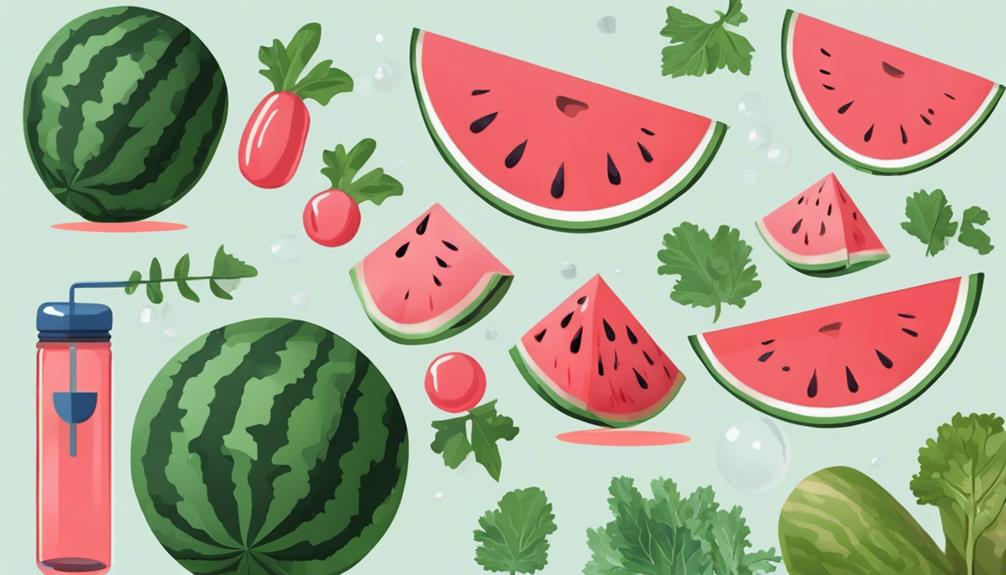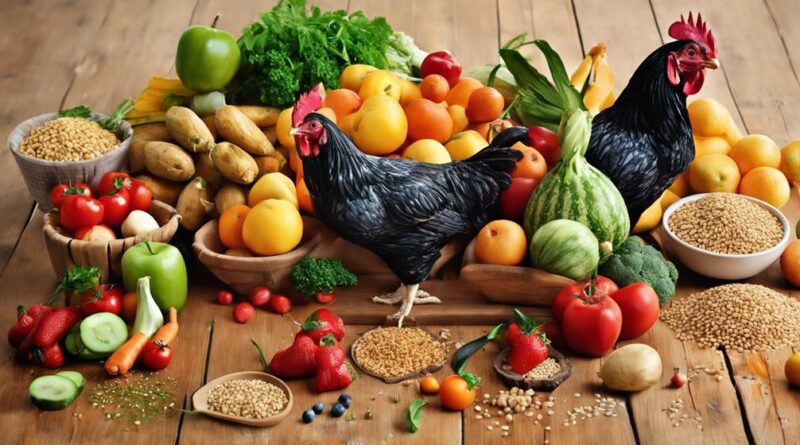Why Should You Feed Your Pet Chickens These Foods?"
Feed your pet chickens grains for key nutrients aiding health, egg production, growth, and immunity. Fresh veggies balance diets, boost digestion, manage weight, and enhance egg quality. Protein treats like mealworms and sunflower seeds are vital for muscle strength and overall health. Calcium sources ensure sturdy eggshells and proper bodily functions. Vitamins A, D, E, K, B-complex, calcium, and magnesium foster growth. Greens provide enzymes, antioxidants, hydration, and fiber. Maintain hydration with clean water and grit for optimal digestion. Avoid harmful foods like avocado, chocolate, onions, garlic, and moldy items. Your chickens will thrive with this diet plan.
Benefits of Feeding Grains
When feeding grains to your pet chickens, you provide essential nutrients crucial for their overall health and egg production. Grains offer a variety of benefits due to their nutritional value, making them a fundamental component of your chickens' diet. The key lies not only in the type of grains you offer but also in the feeding schedule and portion control you implement.
Grains are rich in essential nutrients such as carbohydrates, proteins, vitamins, and minerals. These nutrients play a vital role in supporting your chickens' growth, energy levels, and immune system. By incorporating grains into their diet, you ensure they receive a well-rounded source of nutrition necessary for their well-being.
When it comes to feeding grains to your chickens, it's important to establish a consistent feeding schedule. Providing grains at the same time each day helps regulate their intake and prevents overeating. Additionally, practicing portion control is crucial to maintain a balanced diet. Offering the right amount of grains ensures that your chickens receive the necessary nutrients without excessive calorie intake.
Importance of Fresh Vegetables
Incorporating fresh vegetables into your pet chickens' diet provides essential vitamins and minerals crucial for their overall health and well-being. Fresh vegetables play a vital role in maintaining your chickens' nutritional balance, supporting digestive health, aiding in weight management, and promoting optimal egg production. Here are five key reasons why fresh vegetables are important for your pet chickens:
- Nutritional Balance: Fresh vegetables offer a wide range of nutrients, including vitamins A, C, and K, as well as minerals like calcium and potassium, ensuring your chickens receive a well-rounded diet.
- Digestive Health: The fiber content in vegetables helps regulate digestion, preventing issues such as constipation and promoting gut health in chickens.
- Weight Management: Vegetables are low in calories but high in essential nutrients, making them a healthy option for keeping your chickens at an optimal weight.
- Egg Production: Certain vegetables, such as leafy greens, can enhance egg quality and quantity due to their high levels of nutrients like calcium and antioxidants.
- Overall Health and Well-being: By incorporating fresh vegetables into their diet, you can contribute to your chickens' overall health, immunity, and vitality, ensuring they lead happy and healthy lives.
Protein-Rich Treats for Health
To further enhance your pet chickens' diet and promote their health, consider introducing protein-rich treats that offer essential nutrients for their well-being. Nutritious snacks play a crucial role in ensuring your chickens maintain a balanced diet. Protein is vital for muscle development, feather growth, and overall health in chickens. Providing your feathered friends with a variety of protein-rich treats can contribute to their optimal well-being.
Mealworms are a popular choice among chicken owners as a protein-rich snack. Not only are mealworms enjoyed by chickens, but they're also packed with nutrients. These small treats are easy to digest and provide a good boost of protein. Another excellent option is black soldier fly larvae, which are rich in protein and calcium, benefiting both muscle development and eggshell strength.
Consider incorporating seeds such as sunflower seeds into your chickens' diet. Sunflower seeds aren't only a great source of protein but also contain healthy fats that can contribute to your chickens' overall health. Additionally, Greek yogurt can be a fantastic protein-rich treat for your chickens. It isn't only high in protein but also provides beneficial probiotics for their digestive system.
Calcium Sources for Strong Shells
Consider various calcium sources to ensure your pet chickens develop strong eggshells and maintain optimal health. Adequate calcium intake is crucial for eggshell strength and overall health.
Here are some key points to help you understand the importance of calcium sources for your chickens:
- Calcium Sources: Provide your chickens with a variety of calcium sources to ensure they receive enough of this essential mineral in their diet.
- Eggshell Strength: Calcium plays a vital role in forming strong eggshells, preventing deformities and ensuring the eggs can withstand the incubation process.
- Dietary Balance: Maintaining a proper balance of calcium in your chickens' diet is essential for their overall health and well-being.
- Calcium Absorption: Ensure that your chickens are able to absorb calcium efficiently from their food to support various bodily functions.
- Shell Integrity: A lack of calcium can lead to thin or brittle eggshells, making them more susceptible to damage and reducing their quality.
Essential Vitamins and Minerals
Ensure your pet chickens receive essential vitamins and minerals to support their overall health and productivity. Proper nutrient absorption is crucial for your chickens to thrive. Vitamins and minerals play key roles in various bodily functions, including bone development, immune system support, and egg production. To maintain optimal health, it's essential to provide a well-balanced diet that meets their specific nutritional needs.
Vitamins such as A, D, E, and K are fat-soluble and are essential for normal growth and development. Vitamin A promotes good vision and a healthy immune system, while vitamin D aids in calcium absorption and bone formation. Vitamin E acts as an antioxidant, protecting cells from damage, and vitamin K is necessary for blood clotting. Water-soluble vitamins like the B-complex group are important for energy metabolism and overall vitality.
In terms of minerals, calcium, phosphorus, and magnesium are crucial for strong bones and eggshell formation. Iron is essential for oxygen transport in the blood, while zinc supports immune function and wound healing. Selenium acts as an antioxidant and helps regulate thyroid function. To ensure proper nutrient absorption, maintain dietary balance by offering a variety of nutrient-dense foods.
Healthy Greens for Variety
Introduce a variety of healthy greens into your pet chickens' diet to enhance their nutritional intake and provide them with a diverse range of essential nutrients. Including a mix of nutritious sprouts, tasty herbs, leafy greens, and garden delights can offer numerous health benefits to your feathered friends.
- Nutritious Sprouts: Sprouts are rich in enzymes, vitamins, and minerals, providing a concentrated source of nutrients that can support your chickens' overall well-being.
- Tasty Herbs: Herbs like parsley, basil, and cilantro not only add flavor to your chickens' diet but also offer antioxidant properties and essential nutrients vital for their health.
- Leafy Greens: Incorporating leafy greens such as kale, spinach, and Swiss chard can contribute to a balanced diet, offering vitamins A, K, and C, as well as minerals like calcium and iron.
- Garden Delights: Vegetables like zucchini, cucumber, and pumpkin from your garden can provide hydration, fiber, and additional vitamins to keep your chickens healthy and satisfied.
- Variety is Key: Offering a diverse selection of healthy greens ensures that your chickens receive a wide range of nutrients, promoting optimal health and vitality in your flock.
Hydration Through Water and Grit

To maintain optimal hydration levels for your pet chickens, ensure they have access to clean water and grit at all times. Water quality is crucial in preventing dehydration, a common issue that can affect the health and productivity of your chickens. Provide fresh, clean water in a container that's large enough for all your chickens to drink comfortably. Regularly check the water to ensure it's free from contaminants and debris. Chickens can consume a surprising amount of water, especially during hot weather or when laying eggs, so it's essential to monitor and refill their water source regularly.
In addition to water, grit plays a vital role in your chickens' digestion and overall crop health. Grit consists of small, hard particles like stones or insoluble minerals that chickens ingest to help grind their food in the gizzard. This grinding action aids in breaking down food particles, making digestion more efficient. Without access to grit, chickens may struggle to properly digest their food, leading to potential health issues. Offer a separate container of grit for your chickens to peck at as needed, ensuring they have a consistent supply to support their digestive processes.
Avoid These Harmful Foods
Maintaining the well-being of your pet chickens involves being mindful of the harmful foods that can jeopardize their health and productivity. As a responsible chicken owner, it's crucial to steer clear of toxic foods that pose common hazards to chickens. Here are some foods you should avoid feeding your feathered friends:
- Avocado: Contains a toxin called persin that's harmful to chickens and can lead to respiratory distress and heart failure.
- Chocolate: Contains theobromine, which is toxic to chickens and can cause symptoms like seizures and even death.
- Onions and Garlic: These foods can lead to anemia in chickens by damaging their red blood cells.
- Raw Beans: Raw beans contain hemagglutinin, which can interfere with a chicken's digestion and cause serious health issues.
- Moldy or Spoiled Foods: Moldy or spoiled foods can contain harmful toxins that are detrimental to your chickens' health and should be avoided at all costs.
Frequently Asked Questions
Can Chickens Eat Avocado or Chocolate?
Chickens shouldn't consume avocado due to the presence of persin, which is toxic to them and can cause digestive issues.
Chocolate is also harmful to chickens because it contains theobromine, a substance that can lead to serious health problems like seizures and even death.
It's crucial to keep these foods away from your feathered friends to ensure their well-being and longevity.
How Often Should Chickens Be Fed Treats?
When determining how often to feed treats to chickens, it's crucial to establish a feeding schedule that balances their nutritional needs.
Treat types should be chosen wisely based on their health benefits and minimal impact on the chicken's diet.
Introducing treats gradually and monitoring their intake is essential for maintaining a healthy diet.
Is It Safe to Feed Chickens Dairy Products?
Yes, it's safe to feed chickens dairy products in moderation. However, dairy alternatives can be better options as they're easier for chickens to digest.
When looking for protein sources, consider options like mealworms, legumes, or seeds. These alternatives provide the necessary nutrients without the potential digestive issues that dairy products may cause.
What Natural Herbs Are Safe for Chickens?
When considering natural herbs safe for chickens, think about herbal supplements that offer benefits like improved health. Natural remedies can support your flock's well-being.
Some safe options include oregano, thyme, and garlic, known for their health-boosting properties. Incorporating these herbs into your chickens' diet can contribute to their overall health and vitality.
Remember to research proper dosages and consult with a veterinarian for guidance on using herbal supplements for your chickens.
Can Chickens Eat Citrus Fruits Like Oranges?
Sure, chickens can eat citrus fruits like oranges, but in moderation. Citrus fruits are safe for chickens as long as they're given in small amounts. Oranges contain vitamin C, which is beneficial for their immune system.
However, too much citrus can be harmful to chickens due to the high acidity levels. It's best to offer a balanced diet with a variety of fruits and vegetables to keep your chickens healthy.
Conclusion
In conclusion, feeding your pet chickens a balanced diet is essential for their overall health and well-being. A diet rich in grains, fresh vegetables, protein-rich treats, calcium sources, essential vitamins and minerals, healthy greens, water, and grit provides the necessary nutrients for strong shells, proper growth, and optimal egg production.
Avoiding harmful foods is equally important to ensure your chickens stay healthy and happy. Remember, a well-rounded diet is key to keeping your feathered friends thriving.
